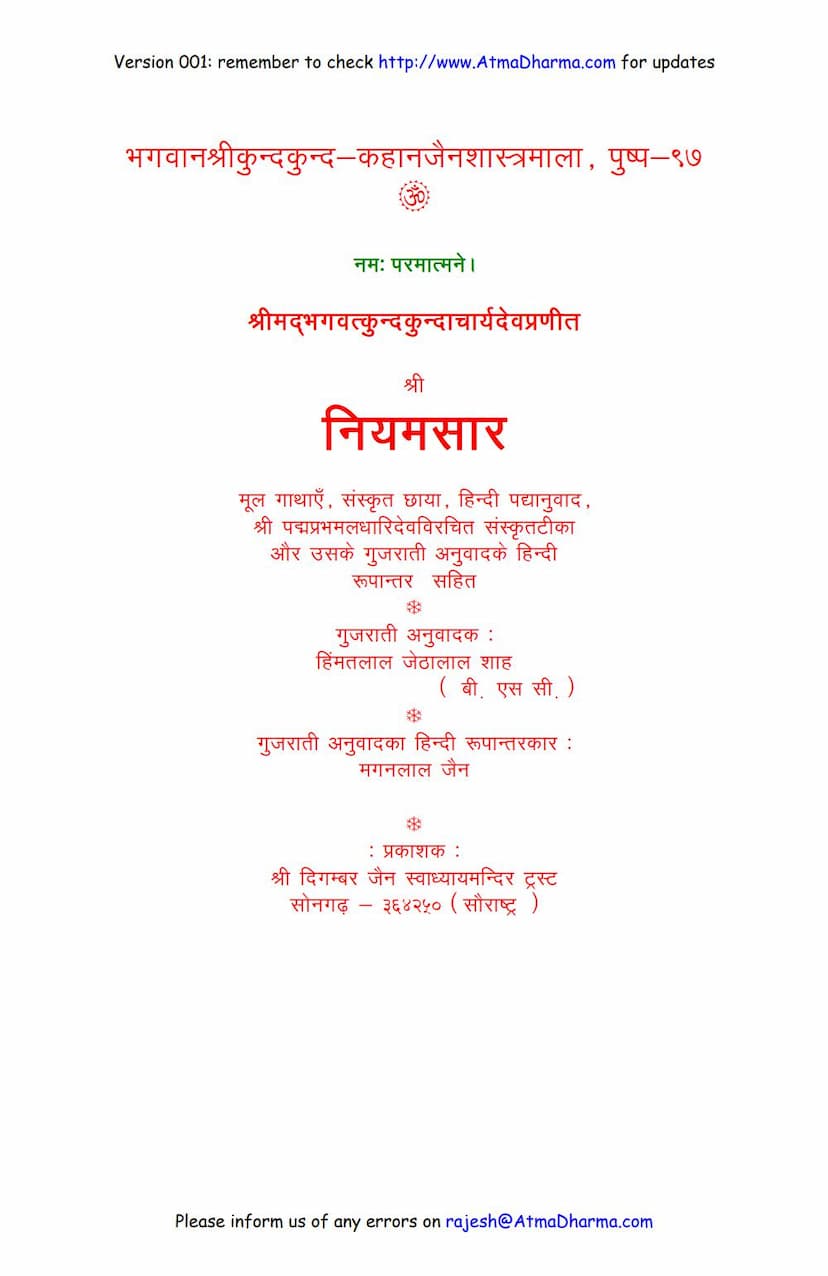Niyamsara
Added to library: September 2, 2025

Summary
This Jain text, "Niyamsara" by Kundkundacharya, translated and elaborated upon by Himmatlal Jethalal Shah, is a profound spiritual guide that delves into the core principles of Jain philosophy, particularly focusing on the path to liberation. The book is published by Shree Digambar Jain Swadhyay Mandir Trust.
Here's a comprehensive summary of its key themes and teachings:
1. The Nature of the Soul and Reality:
- Niyamsara emphasizes the unique and eternal nature of the soul (Jiva) as distinct from non-soul substances (Ajiva). The soul is described as inherently pure, omniscient, omnipotent, and blissful, possessing infinite virtues.
- The text refrains from describing the soul in terms of its worldly manifestations (like birth, death, physical attributes) but rather focuses on its essential, liberated state, which is beyond dualities and perceptions.
2. The Path of Liberation (Moksha Marga):
- Niyamsara elucidates the path to liberation as primarily achieved through right faith (Samyak Darshan), right knowledge (Samyak Gyan), and right conduct (Samyak Charitra) – the Three Jewels (Ratnatraya). These are not merely intellectual concepts but deeply internalized principles that lead to the realization of the soul's true nature.
- The text stresses the importance of detachment (Vairagya) from worldly possessions, relationships, and experiences, which are considered ultimately perishable and the cause of suffering.
3. The Role of Conduct (Charitra):
- The book meticulously details various aspects of conduct, both in their pure, ultimate sense (Nishchay) and in their practical, conventional application (Vyavahar).
- Nishchay Charitra refers to the direct realization and experience of the soul's inherent pure nature, achieved through intense meditation and self-absorption. This is the ultimate goal.
- Vyavahar Charitra encompasses the disciplined conduct and ethical principles that guide the aspirant towards the Nishchay state. This includes:
- Ahimsa (Non-violence): Not just the absence of physical harm, but also non-violence in thought, word, and deed towards all living beings.
- Satya (Truthfulness): Speaking truthful, beneficial, and pleasant words.
- Asteya (Non-stealing): Not taking what is not given.
- Brahmacharya (Celibacy): Control over sensual desires and indulgence.
- Aparigraha (Non-possession): Detachment from all external possessions and internal attachments.
- The Five Samitis (Cautionary Conduct): Walking, speaking, accepting alms, handling objects, and excretion with utmost care and non-violence.
- The Three Guptis (Restraints): Control over mind, speech, and body.
- Pratikraman, Pratyakhyan, and Parishuddhi: These are related to repentance, renunciation, and purification of actions and intentions, respectively. They are vital for shedding karmic impurities.
- Samayika: A state of equanimity and spiritual contemplation.
4. Emphasis on Inner Purity and Self-Realization:
- Niyamsara powerfully advocates for the introspection and internalization of spiritual principles. True devotion, compassion, and ethical conduct stem from the realization of the soul's inherent purity and oneness.
- The text critiques external rituals and practices that are performed without inner spiritual realization or detachment, highlighting that true spirituality is an inner transformation.
5. The Importance of the Guiding Guru:
- The text implicitly and explicitly acknowledges the pivotal role of a true spiritual guide (Guru) in helping the aspirant navigate the path to liberation. The commentaries and introductions often mention the profound influence and guidance of spiritual masters.
6. The Distinction Between Nays (Perspectives):
- Kundkundacharya masterfully employs the Jain concept of Nayas (perspectives) to explain spiritual truths. The book often contrasts the ultimate reality (Nishchay) with conventional reality (Vyavahar) to provide a complete understanding of the path. Nishchay represents the ultimate truth of the soul's nature, while Vyavahar represents the practical steps and observances on the path.
Overall Message:
Niyamsara is a text that guides the seeker towards the realization of the soul's inherent purity and liberation from the cycle of birth and death. It emphasizes self-effort, introspection, detachment, and the unwavering pursuit of the soul's true nature through right faith, knowledge, and conduct, all under the guidance of pure spiritual masters. The text serves as a practical manual for spiritual progress, urging the reader to transcend external formalities and focus on the inner transformation of consciousness.